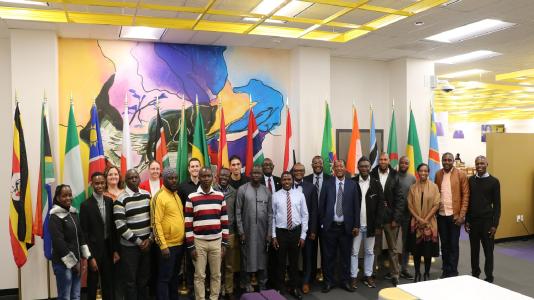Argonne and Prairie View A&M University hosted International Atomic Energy Agency workshops for African educators
Argonne and historically Black university collaborate on courses in nuclear science and technology

Nuclear science and technology (NST) impact our daily lives in a myriad of ways. From nuclear power to radiation cancer treatments and agriculture protection, NST is critical to improving the standard of living in countries with growing energy requirements. Despite this, NST is commonly misunderstood by the public and overlooked as a future career path, as it is often not a part of the formalized educational curriculum.
To address this challenge, the International Atomic Energy Agency (IAEA) and its partners, such as the U.S. Department of Energy’s (DOE) Argonne National Laboratory, are working to improve NST education, including hosting a workshop for secondary school educators from across the continent of Africa. The workshop was held at Prairie View A&M University (PVAMU) in Texas, a Land-Grant Historically Black College and University (HBCU) in October.
While Argonne has been involved with IAEA efforts to expand NST education at the secondary school level since 2018, this was the first course focused on Africa.
“I hope the teachers from the African secondary schools who attended this inaugural IAEA training event hosted by PVAMU came away with strengthened technical knowledge of nuclear science and technology,” said Sunaree Hamilton, group leader for IAEA Programs in Argonne’s Strategic Security Sciences division. “They can apply this knowledge in the classroom to educate and inspire students throughout the African region to pursue STEM.”
The course provided students with a wide range of local opportunities and also strengthened partnerships between the national laboratory complex, the IAEA and HBCUs. Working with Godlove Fonjweng, the Executive Director for International & Intercultural Programs and teaching staff at PVAMU, students were given tours of various facilities outside of Houston where they saw NST careers in practice, including medical facilities using nuclear technology, agricultural uses and nuclear reactors
“I hope the teachers from the African secondary schools who attended this inaugural IAEA training event hosted by PVAMU came away with strengthened technical knowledge of nuclear science and technology.” — Sunaree Hamilton, Argonne National Laboratory
“Our student educators started with the basics of nuclear energy. We didn’t presume any knowledge. There were two reasons for this. For one, everyone could grow together, and two, by starting with the basics, we provided a great example of how to teach NST,” said Dave Grabaskas, Argonne’s manager of Licensing and Risk Assessments in the Nuclear Science and Engineering division and technical lead for the course.
Program participants included secondary school educators chosen among the African member states of the IAEA, with each one hailing from a different African country. In addition to the African participants, PVAMU faculty and graduate students were part of the program alongside Argonne experts, providing additional education and curriculum development training. The IAEA selected the candidates from IAEA’s member states and focused on developing regions.
“People have previous associations with nuclear technology but there are so many peaceful applications of nuclear technologies,” said Fonjweng. “Offering secondary school teachers from Africa the opportunity to develop strategies for introducing nuclear energy content in STEM teaching is ultimately beneficial to our planet and its inhabitants.”
“This program offered us the opportunity to demonstrate our commitment to serving the global community and for our faculty to demonstrate their commitment to solving global problems,” said Fonjweng.
The three-week course included seminars on basic nuclear energy, nuclear radiation, waste management and sections on medical technology. They also had some fun experiments, including a Cloud Chamber demonstration educators showed to make radiation visible to the naked eye. Multiple trips were planned each week, including a visit to a U.S. high school.
“The program’s participants were asked to develop a one-hour lesson plan on an NST topic, using an innovative teaching approach, and then they had a chance to present it,” said Grabaskas. Grabaskas is a veteran of nuclear technology education from other programs. He developed much of the curriculum and led a number of the technical sections. “They had a chance to create an action plan for when they go back to their countries to teach their students.”
Argonne National Laboratory seeks solutions to pressing national problems in science and technology by conducting leading-edge basic and applied research in virtually every scientific discipline. Argonne is managed by UChicago Argonne, LLC for the U.S. Department of Energy’s Office of Science.
The U.S. Department of Energy’s Office of Science is the single largest supporter of basic research in the physical sciences in the United States and is working to address some of the most pressing challenges of our time. For more information, visit https://energy.gov/science.